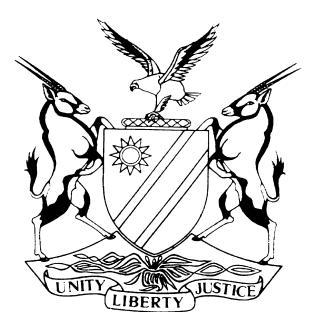3
REPUBLIC OF NAMIBIA

IN THE HIGH COURT OF NAMIBIA, MAIN DIVISION, WINDHOEK
REVIEW JUDGMENT
PRACTICE DIRECTIVE 61
Case Title: The State v Uwaegbu Prince Conrad Tatah | Case No: CR 103/2023 | |
High Court MD Review No:1279/2023 | Division of Court: High Court, Main Division | |
Coram: Liebenberg J et Shivute J | Delivered: 16 October 2023 | |
Neutral citation: S v Tatah (CR 103/2023) [2023] NAHCMD 650 (16 October 2023) | ||
ORDER:
| ||
REASONS: | ||
LIEBENBERG J (SHIVUTE J concurring): [1] Before court is a review from the Magistrate’s Court of Katima Mulilo where the accused stood charged with a contravention of s 82(5)(a) read with sections 1, 82(6), 82(7), 86,89(1) and 89(4) of the Road Traffic and Transport Act 22 of 1999 (the Act) – Driving with an excessive breath alcohol level amongst other charges. This review relates only to the charge as aforementioned. [2] The accused pleaded guilty and was convicted on his guilty plea in terms of s 112(1)(b) of the Criminal Procedure Act 51 of 1977 (the CPA). He was sentenced to N$5000 or 3 months’ imprisonment. [3] On review, the following query was directed to the court a quo ‘On count 1 the court through its questioning in terms of s 112(1)(b) of the CPA omitted to establish whether the breath alcohol specimen was obtained within the prescribed period. Does the omission not taint the conviction?’ [4] The magistrate responded as follows to the query: ‘I understood the responses of the accused to the effect that the police stopped him around 09h00 in the morning and then a breathalyzer test was administered on the accused soon thereafter. The test results were found to be above the prescribed limit. The accused did not dispute the allegations put to him. For this reason I believe that the provisions of section 82(6) of Act 22 of 1999 were complied with. However, this fact should have been clear on the record. Overall, I do not believe the omission tainted the conviction.’ [5] The provisions of s 82(6) provide that: ‘If, in any prosecution for a contravention of subsection (5), it is proved that the concentration of alcohol in any specimen of breath of the person concerned exceeded 0,37 milligrams per 1 000 millilitres of breath taken at any time within two hours after the alleged offence, it shall be presumed, in the absence of evidence to the contrary, that such concentration exceeded 0,37 milligrams per 1 000 millilitres at the time of the alleged offence.’ (Emphasis provided) [6] It is evident from s 82(6) of the Act that to be valid, a breath specimen must be taken from an accused within two hours of the commission of the offence. Whilst the record reflects that during questioning in terms of s 112(1)(b) of the CPA, the accused indicated that the incident happened around 09h00 in the morning, it does not specify, as the magistrate suggests, whether the 09h00 was ‘anytime within the two hours as stipulated in the Act. A reading of the record suggests that the 09h00 referred to was the time of arrest. There is thus no indication that the breath specimen was taken within the prescribed two hours as this element was not established during the court’s questioning. The fact that the accused did not dispute the allegations put to him is not sufficient reason to convict him of an offence when all its elements have not been proven. In fact, it cannot be argued that the allegations were not disputed for the simple reason that not all the allegations were put to the accused during the court’s questioning. This should have been borne out by the record of the proceedings and not left for speculation. [7] The court a quo failed to ask the accused whether the breath specimen was taken within two hours after the incident, a crucial element which, by its omission, clearly taints the conviction imposed. The conviction and, consequently, the sentence on count 1, stand to be set aside. [8] In the result, the following order is made:
| ||
J C LIEBENBERG JUDGE | N N SHIVUTE JUDGE | |
Cited documents 2
Legislation 2
| 1. | Criminal Procedure Act, 1977 | 1919 citations |
| 2. | Road Traffic and Transport Act, 1999 | 313 citations |